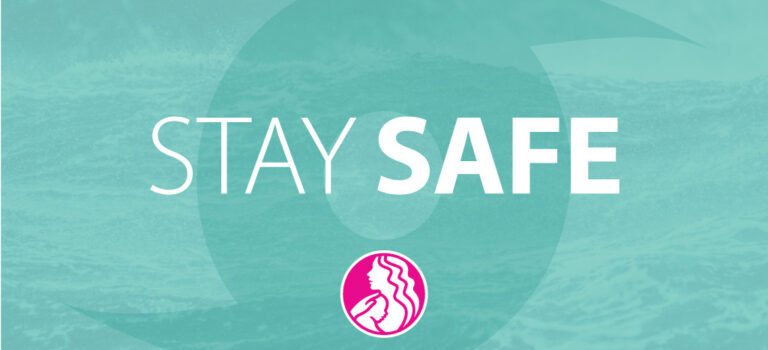Hurricane Season is here, and it (like many other things) becomes a little more difficult when you are expecting. But planning and preparing for possible storms in advance can help reduce stress (a major factor in preterm labor) that comes with the cone of uncertainty!
GET A KIT
The American Red Cross recommends keeping the following supplies in a portable, waterproof container that you can use at home or take with you in case you must evacuate:
- One gallon of water per person (3 day supply)
- Non-perishable, easy-to-prepare food (3 day supply)
- Flash light
- Battery-powered or hand-crank radio
- Extra batteries
- First aid kit
- Medications (7-day supply)
- Multi-purpose tool
- Sanitation and personal hygiene items
- Copies of personal documents (medication list and pertinent medical information, proof of address, deed/lease to home, passports, birth certificates, insurance policies)
- Cell phone chargers
- Family and emergency contact information
- Cash
- Emergency blankets
- Games and activities for children
If you are expecting, you will also need to include:
- Baby supplies (bottles, formula, baby food, diapers)
- Simple, nutritious foods: protein bars, dried fruit and granola are great options
- Extra bottled water and blankets
- Maternity and baby clothes
- Prenatal vitamins and any other medications currently taking
- Emergency birth supplies: clean towels, sharp scissors, infant bulb syringe, medical gloves, sheets and sanitary pads
- A copy of your prenatal care records and immunizations, all current medications and the name and telephone number of your doctor.
GET A GAME PLAN
Every hurricane is different. In some cases, you may have a day or two to prepare for an evacuation while other situations might call for an immediate evacuation. Planning is vital to making sure that you can evacuate quickly and safely.
- Decide where you will go: a hotel/motel, friends or relatives a safe distance away, evacuation shelter.
- Use Louisiana’s Emergency Evacuation Map to help plan and locate alternative routes.
- Calculate approximately four (4) times the normal driving time.
Pregnant women should consider:
- Phone numbers/locations of OBs near evacuation destinations.
- Discussing their plan with their doctor. If you are close to your delivery date or have a high risk pregnancy, ask your doctor if it’s safe to travel or if you should seek shelter at a hospital.
- Depending on the hospital’s policy, you may need to consider child care options if you have other children.
GET INFORMED
Lastly, it is important to think about how you will get important information to help keep you safe during a hurricane. Identify how local authorities will notify you during a disaster and make sure you have adequate tools to receive that information. Here are few Louisiana Emergency resources to consider:
- Louisiana Emergency Alert System: In the event of an emergency, turn to your local radio station for emergency information.
- National Weather Service
- Louisiana Department of Transportation & Development
- Emergency.la.gov
- Louisiana State Police
- American Red Cross

